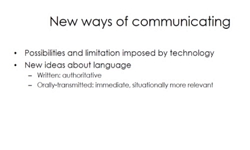This study examines the comedy films from 1956 to 1961 and makes a comparative analysis of some modes of comedy films. The motivation for this comparative analysis is to try to define the meanings and the functions of comedy constituted in post-war mo...
http://chineseinput.net/에서 pinyin(병음)방식으로 중국어를 변환할 수 있습니다.
변환된 중국어를 복사하여 사용하시면 됩니다.
- 中文 을 입력하시려면 zhongwen을 입력하시고 space를누르시면됩니다.
- 北京 을 입력하시려면 beijing을 입력하시고 space를 누르시면 됩니다.
https://www.riss.kr/link?id=A76149232
- 저자
- 발행기관
- 학술지명
- 권호사항
-
발행연도
2005
-
작성언어
Korean
- 주제어
-
등재정보
KCI등재후보
-
자료형태
학술저널
- 발행기관 URL
-
수록면
235-264(30쪽)
-
KCI 피인용횟수
6
- 제공처
- 소장기관
-
0
상세조회 -
0
다운로드
부가정보
다국어 초록 (Multilingual Abstract)
This study examines the comedy films from 1956 to 1961 and makes a comparative analysis of some modes of comedy films. The motivation for this comparative analysis is to try to define the meanings and the functions of comedy constituted in post-war modernization era. The ultimate objective is a finer understanding of the nature of the modernity of Korean cinema.
The popularity of the comedy is unique in post-war era. Post-war comedy films are above all based on a reality that is limited both spatially and temporally. That complicity may focus on. It is possible to establish a specific generic form within the context of a cultural history. Through an analysis of form of postwar comedy film, it appears in three formal characteristics through which laugh is embodied.: 1) a form of comedy of manners 2) a form of conversation or controversy 3) a form fo satire.
Like any other comedy, post-war Korean comedy is an inherently ambivalent one. Post-war comedy films are both subersive and conservative, both offensive and inoffensive, both serious and ridiculous. Comedy is a good example of the various ways in which this ambivalence does and does not become represented within a specific culture. Our aim in this paper is to examine comedy film as an 'in-between space'. We do not think of comedy film as maintaining or subverting certain culturally and nationally specific values, but rather take it as an imaginary space in relation to which people in post-war Korea try to make sense of their cultural ambivalence. In general, the function of post-war film may in expert maintenenance of the ambivalence of this culturally and historically distinctive symbiosis of conservatism and subversion.
목차 (Table of Contents)
- 1. 머리말
- 2. 풍속의 기록
- 3. 대화의 개방성
- 4. 세태풍자 코미디와 개성적 인물
- 5. 맺음말
- 1. 머리말
- 2. 풍속의 기록
- 3. 대화의 개방성
- 4. 세태풍자 코미디와 개성적 인물
- 5. 맺음말
- 참고 문헌
- Abstract
참고문헌 (Reference)
1 "현대성과 현대문화" 2001.
2 "한국영화의 복고,남성,멜로" 2002년
3 "한국영화사 강의" 소도 2002.
4 "한국영화가 재현하는 성의 정치학」" 2004년
5 "텔레비전과 현대비평" 1994.
6 "우리 안의 파시즘" 삼인 2000.
7 "스크린 밖의 한국영화사" 인물과 사상사 2002.
8 "소설을 통해 본 인권의 현장」 창작과 비평" 1977년여름호.
9 "문학의 노동화와 노동의 문학화」" 1983.
10 "노동시장과 노사관계의 변모」 ,한국현대사와 사회변동" 문학과 지성사 1997.
1 "현대성과 현대문화" 2001.
2 "한국영화의 복고,남성,멜로" 2002년
3 "한국영화사 강의" 소도 2002.
4 "한국영화가 재현하는 성의 정치학」" 2004년
5 "텔레비전과 현대비평" 1994.
6 "우리 안의 파시즘" 삼인 2000.
7 "스크린 밖의 한국영화사" 인물과 사상사 2002.
8 "소설을 통해 본 인권의 현장」 창작과 비평" 1977년여름호.
9 "문학의 노동화와 노동의 문학화」" 1983.
10 "노동시장과 노사관계의 변모」 ,한국현대사와 사회변동" 문학과 지성사 1997.
11 "남성중심적 영화의 역설 분열하는 남성 정체성」"
12 "김정아 옮김 발터 벤야민과 아케이드 프로젝트" 문학동네 2004.
13 "Immigrant Women in the Land of Dollars" 1985.
14 "1970년대 체제이행기의 남북한 비교영화사" 영화진흥위 2004.
동일학술지(권/호) 다른 논문
-
- 한국영화학회
- 김경욱(Kim Kyoung Wook)
- 2005
- KCI등재후보
-
그리너웨이(Peter Greenaway) 영화 〈화가의 계약 The Draughtsman's Contract〉에 나타난 실험영화적 특징과 미학 연구
- 한국영화학회
- 김금동(Kim Keum Dong)
- 2005
- KCI등재후보
-
- 한국영화학회
- 김려실(Kim Ryeo Sil)
- 2005
- KCI등재후보
-
- 한국영화학회
- 김무규(Kim Moo Kyu)
- 2005
- KCI등재후보
분석정보
인용정보 인용지수 설명보기
학술지 이력
| 연월일 | 이력구분 | 이력상세 | 등재구분 |
|---|---|---|---|
| 2026 | 평가예정 | 재인증평가 신청대상 (재인증) | |
| 2020-01-01 | 평가 | 등재학술지 유지 (재인증) |  |
| 2017-09-22 | 학회명변경 | 영문명 : Film Studies Association Of Korea (Fisak) -> Korean Cinema Association (KCA) |  |
| 2017-01-01 | 평가 | 등재학술지 유지 (계속평가) |  |
| 2013-01-01 | 평가 | 등재 1차 FAIL (등재유지) |  |
| 2010-01-01 | 평가 | 등재학술지 유지 (등재유지) |  |
| 2007-01-01 | 평가 | 등재학술지 선정 (등재후보2차) |  |
| 2006-04-09 | 학술지등록 | 한글명 : 영화연구외국어명 : Film Studies |  |
| 2006-01-01 | 평가 | 등재후보 1차 PASS (등재후보1차) |  |
| 2004-01-01 | 평가 | 등재후보학술지 선정 (신규평가) |  |
학술지 인용정보
| 기준연도 | WOS-KCI 통합IF(2년) | KCIF(2년) | KCIF(3년) |
|---|---|---|---|
| 2016 | 0.58 | 0.58 | 0.59 |
| KCIF(4년) | KCIF(5년) | 중심성지수(3년) | 즉시성지수 |
| 0.58 | 0.55 | 1.055 | 0.29 |





 DBpia
DBpia





